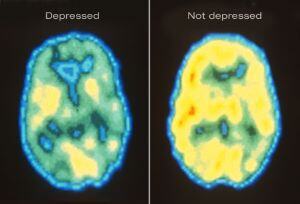Is TMS treatment safe?
January 29, 2020 - Smart TMS

One of the most searched for terms relating to Transcranial Magnetic Stimulation is “Is TMS safe?”. We explained to the team at www.netdoctor.co.uk about TMS treatment and helped them to understand how it works.
How does TMS work?
Practitioner Chloe* explains:
TMS essentially works by delivering magnetic pulses through a coil held up against the scalp. The magnetic pulses induce an electric current in the nerve cells. The TMS can deliver low-frequency pulses at 1 Hertz to reduce the activity in the brain cells or high-frequency pulses at 10 Hertz to increase the activity in the brain.
When a patient is suffering with depression, the activity in the brain cells is reduced. By using high frequency pulses, this activity is increased and, as a result, the symptoms of depression begin to lift. Brain scans show that there are more connections between brain cells following TMS. This is referred to as neuroplasticity – or the ability of nerves to repair and reconnect.

This image shows the scans of a brain before and after receiving rTMS treatment.
But, is TMS safe?
In short, the answer is yes! TMS was created in the UK in the 1980s and has been studied and developed ever since. Extensive research has been completed to understand the exact area of the brain that should be targeted using the magnetic pulses in order to see results. Smart TMS offer only rTMS (repetitive Transcranial Magnetic Stimulation) as this is much more focused on the correct area, rather than impacting the entire brain like similar brain stimulation techniques do.
Side effects
Typical treatment for mental health conditions tends to include talking therapies, followed by medication, like antidepressants. Medication, however, comes with it’s own side effects. According to the NHS, common side effects of anti-depressants include:
- feeling agitated, shaky or anxious
- feeling and being sick, indigestion and stomach aches
- loss of appetite
- dizziness and headaches
- not sleeping well (insomnia), or feeling very sleepy
- low sex drive and sexual dysfunction
In some cases, patients find the side effects to be unbearable, which results in them stopping the use of the medication entirely. In the case of depression, some patients even go on to receive ECT (electroconvulsive therapy). ECT requires a patient to stay in hospital and have a general anaesthetic. Memory loss is traditionally associated with the therapy and patients can find themselves with aching muscles as a result of the controlled seizures induced during ECT.
In comparison, TMS treatment has fewer side effects, many of which are mild and transient. Around 1 in 50,000 TMS sessions can result in a seizure and approximately 1 in 10 patients will have a mild headache following treatment. Tiredness is also reported as a side effect of TMS, but this shouldn’t be anything that an early night won’t fix.
Is everyone suitable to receive TMS?
As TMS is non-invasive and has few side effects, a large majority of people are suitable. During a consultation with a TMS Clinician, you’d discuss your medical history and condition, to ascertain if TMS is safe for you. Chloe explains that there are a few contraindications to be considered:
There are a few contra-indications which may mean patients are unable to undergo TMS treatment such as ferromagnetic implants (any ferromagnetic metals within 30cms of the location of the coil), cochlear implants and dental implants made from magnetically sensitive material and located on the side of stimulation are an absolute contraindication.
Find out if you’re suitable to receive TMS treatment with our suitability checker. You can also contact our team of patient advisors:
- Tel: 0345 222 5678
- Email: info@smarttms.co.uk
If you’re calling from Ireland, you may prefer to contact our Dublin clinic:
- Email: info@smarttms.ie
- Tel: 353 (01) 254 2514
- Website: www.smarttms.ie
*Chloe is no longer working for Smart TMS. The Birmingham clinic is now run by our practitioner Lorelei-Jane.










